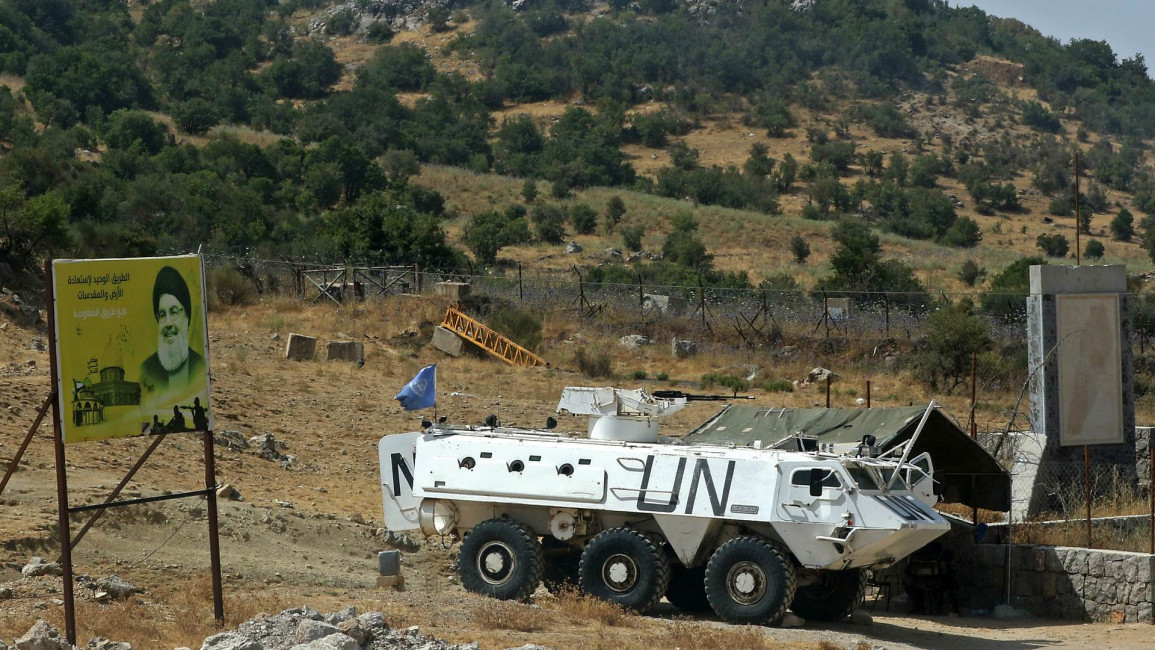US extends national emergency for Lebanon citing Hezbollah, Israel tensions
US extends national emergency for Lebanon citing Hezbollah, Israel tensions
The growing power of Hezbollah constitutes an 'extraordinary threat to the national security and foreign policy of the United States', Trump said.
2 min read
A UN peacekeeping patrol near Lebanon's southern border with Israel [Getty]
US President Donald Trump announced he will extend a 13-year national emergency with regard to Lebanon, due to the country's fraught political situation as well as two attacks in as many days by neighbouring Israel.
The White House published a document on Wednesday laying out the reasons for extending the executive order beyond its expiration date of 1 August 2020, which included Iran-backed Hezbollah's growing power.
"Certain ongoing activities, such as Iran's continuing arms transfers to Hizballah - which include increasingly sophisticated weapons systems - serve to undermine Lebanese sovereignty, contribute to political and economic instability in the region, and continue to constitute an unusual and extraordinary threat to the national security and foreign policy of the United States," Trump stated in the document.
"For this reason, I have determined that it is necessary to continue the national emergency declared in Executive Order 13441 with respect to Lebanon," he added.
The executive order was first made under President George Bush in 2007, and has been updated every year since.
"This is a routine assessment that takes place every year, reaffirming the continuation of the same policy since 2007, the consequences of which are already known," Lebanese ambassador to the Washington Gabriel Issa told Newsweek.
Israel claimed on Monday that a Hezbollah cell had attempted to breach its border, and reported clashes with the Lebanese militants.
Hezbollah has accused Israel of fabricating the incident and said its fighters were not involved in the clashes.
It follows heightened tensions due to concerns in Israel that Hezbollah might retaliate for the killing of one of its fighters in Syria last week.
Israeli reinforcements were sent to its northern border region with Lebanon last week, due to threats from Hezbollah leader Hassan Nasrallah last year that the next killing of its fighters by Israel would result in retaliation.
Hezbollah's deputy, Naim Qassem, said that the movement would respond to the suspected Israeli airstrike that killed one of its fighters near Damascus, but it would not lead to "all-out war".
Israel Benjamin Netanyahu said on Tuesday that he would do "everything necessary" to defend the country from Hezbollah attacks.
The White House published a document on Wednesday laying out the reasons for extending the executive order beyond its expiration date of 1 August 2020, which included Iran-backed Hezbollah's growing power.
"Certain ongoing activities, such as Iran's continuing arms transfers to Hizballah - which include increasingly sophisticated weapons systems - serve to undermine Lebanese sovereignty, contribute to political and economic instability in the region, and continue to constitute an unusual and extraordinary threat to the national security and foreign policy of the United States," Trump stated in the document.
"For this reason, I have determined that it is necessary to continue the national emergency declared in Executive Order 13441 with respect to Lebanon," he added.
The executive order was first made under President George Bush in 2007, and has been updated every year since.
"This is a routine assessment that takes place every year, reaffirming the continuation of the same policy since 2007, the consequences of which are already known," Lebanese ambassador to the Washington Gabriel Issa told Newsweek.
Twitter Post
|
Israel claimed on Monday that a Hezbollah cell had attempted to breach its border, and reported clashes with the Lebanese militants.
Hezbollah has accused Israel of fabricating the incident and said its fighters were not involved in the clashes.
It follows heightened tensions due to concerns in Israel that Hezbollah might retaliate for the killing of one of its fighters in Syria last week.
Israeli reinforcements were sent to its northern border region with Lebanon last week, due to threats from Hezbollah leader Hassan Nasrallah last year that the next killing of its fighters by Israel would result in retaliation.
Hezbollah's deputy, Naim Qassem, said that the movement would respond to the suspected Israeli airstrike that killed one of its fighters near Damascus, but it would not lead to "all-out war".
Israel Benjamin Netanyahu said on Tuesday that he would do "everything necessary" to defend the country from Hezbollah attacks.
The flare-up comes as Lebanon experiences its worst economic crisis since the end of its civil war thirty years ago.
Follow us on Facebook, Twitter and Instagram to stay connected



